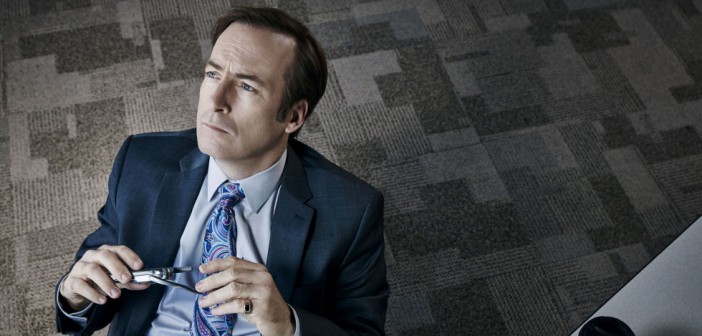Banking compliance is complicated. Mesa Verde top dog Kevin Wachtell (Rex Linn, making the most of his recurring role) knows that he doesn’t have a firm grasp on how to conform to regulations. But he and his colleague Paige (Cara Pifko, likewise enjoying semi-regular status) certainly know why they’re beholden to the Community Reinvestment Act and similar mandates. It’s because their business begins and ends with profit. It’s a closed loop with no peripheral vision outside of its cynical motive. If there were more nobles among the banking industry’s multitude of robber barons, banks could — ironically — save enough on lawyer-retainer fees to just about make up the difference lost on short-term gains. Wouldn’t it all be so much simpler if everyone just played by the rules?
Neither Jimmy nor Kim is under the impression that Mesa Verde, HHM, or anyone else operates within a principled code, but they have vastly different ways of adapting to that reality. (Getting on the same page is imperative if they’re going to rent out adjacent dentist’s offices from Steve at Kleinfeld.) Kim needs to believe that by setting an ethical precedent and resigning from HHM in person, Howard will be compelled to demonstrate exceptional restraint and step aside while she secures Mesa Verde as her solo practice’s first big fish. Jimmy, not surprisingly, is bemused by her naiveté, but smitten enough to encourage her. It’s amazing how genuine he is in his disingenuousness.
Inevitably, Howard pounces on his protégé’s mistake and — with a shocking assist from Chuck, who braves the bright lights and cell phones of a functioning conference room in order to undermine his brother — snatches Mesa Verde right out from under Kim’s nose, effectively squashing her self-esteem. As Howard tellingly details, daddy never let him be his own man, so it should have been obvious right there that he had no intention of letting Kim get a head start on becoming her own woman.
Jimmy’s heart breaks for Kim, but he’d long since hardened to the impenetrability of self-interest. It started while watching customer after customer dupe his dad (those father issues can be a mother) out of small change, then cemented with Chuck’s stunning betrayal. Now he’s ready for a fight, anxiously rubbing Marco’s pinky ring in decisive moments like a cowboy romances his holstered gun before a duel. In Jimmy’s estimation, honor is relative among thieves. Kim tried things her way, but now it was time for him to sneak into Chuck’s Mesa Verde files, head to the 24-hour copy shop, and sabotage HHM by surgically altering the address number on all documents pertaining to construction of a new branch site. It’s hard to say whether his end goal is to salvage some business for Kim or merely avenge her, but à la Chuck’s reasons for intervening on Howard’s behalf, sibling rivalry is the likeliest incentive.
It’s amazing to consider that, when Saul began, the producers had no ideaJimmy and Chuck’s relationship would sour. There’s nothing terribly dramatic about a younger, ne’er-do-well brother tending to his hermetic, eccentric older sibling. Their earliest scenes together were helpful in distinguishing Jimmy from Saul, but lacked a coherent dynamic. Now, as we near the end of season two, the McGill brothers’ saga is coming into its own. “Fifi” makes its clearest strides yet toward suggesting that Chuck’s supposed electromagnetic hypersensitivity is a perversion of his unresolved anger. And like Howard, when backed into a corner, Chuck instinctively locates his defense mechanism and — knowingly or not — deploys it in tyrannical and controlling ways. Why couldn’t Howard, rather than Kim, have been the solo-practicing idealist? How come Chuck, not Jimmy, has had to be the humorless hard worker? Both Howard and Chuck are lashing out in lieu of time for that “fresh start,” while Jimmy and Kim assess how to begin anew. How much baggage is worth bringing with them from the past?
As for Mike, who knows what he stands to gain by hectoring Hector? A small measure of satisfaction, perhaps — a prideful man unwilling to quietly comply with a violent organization’s unwritten rules of criminal conduct. In the underworld, as opposed to publicly held high finance, ethics are turned inside-out. Elusive governing bodies like the cartel impose guidelines through fear and intimidation; compliance is far from legal, but necessary to survive. Mike’s already done his part in enabling one corrupt institution (i.e. the Philadelphia Police Department), so even if his disruption of Tio’s shipments can’t unravel a tightly wound family syndicate, he’s damned sure gonna make the old man’s meth-peddling business a living nightmare — one set of blown tires at a time.

